Syrian minorities fear a Western attack will be seen as ‘Christian’
by - 18th September 2013
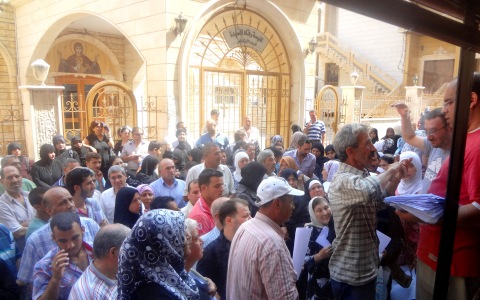
MEDIA reports that portray Christians in Syria as helpless minorities in need of protection fail to recognise the powerful role that this minority group is playing in providing ‘immediate tangible’ humanitarian aid from within the conflict-ridden country.
Last week, it was reported that rebels had attacked the Christian town of Maaloula as a punishment to its residents – many of whom have now fled – for supporting the Assad government.
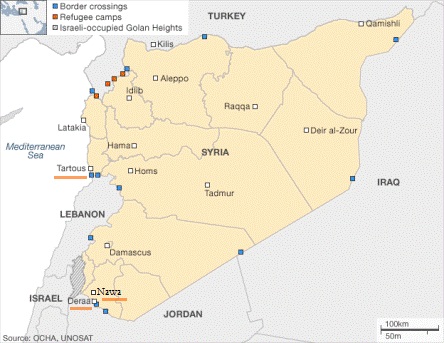
Lapido has heard there is real fear among believers in towns such as Aleppo that a Western invasion would be seen as a ‘Christian’ invasion, thus rendering Christians in the region subject to further attacks.
It is reported that 450,000 of Syria’s two million Christians – who constitute around ten per cent of the population - have been displaced, as their churches burn and they continue to be counted among the casualties of the bloody conflict.
But many Christians remain in the country; reluctant to leave their homes and a country which played such a crucial role in the foundation of their faith.
People in parts of Syria still speak Aramaic, the language Christ spoke.
Speaking at an event organised for Syrian church youth leaders organised by Open Doors and Youth for Christ last week, Hafez* said: ‘I don’t judge anyone that has left the country. But this is the land, the home of Christians.
‘From this area and country, Christianity spread over the world. The conflicts that our forefathers faced in this area weren’t harder or easier than ours now.’
He added: ‘We as Christians have to witness. We have to stand for justice and for truth. We are witnesses of Jesus. That is our identity; that is why we are here.’
Choosing
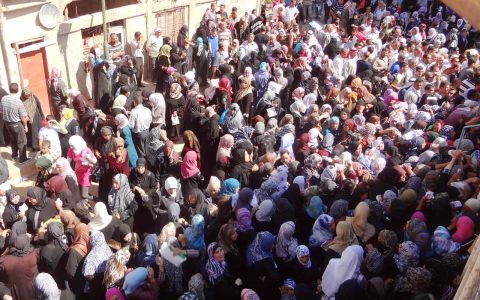
Christian organisations within Syria are not just choosing to remain, but playing a vital role in providing humanitarian aid.
The International Orthodox Christian Charities (IOCC) and the Greek Orthodox Patriarchate of Antioch and All the East (GOPA) have established four offices in the governorate to assist with the influx of people needing aid. The Orthodox Church of Antioch is coordinating religious leaders throughout the region by calling for an end to the violence and providing a safe place for dialogue.
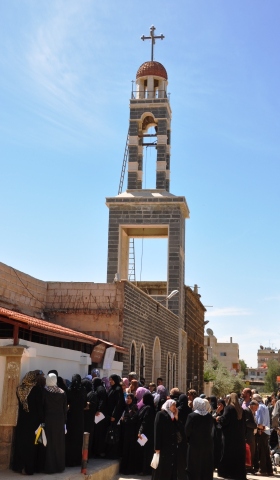 International Orthodox Christian Charities (IOCC) – a partner of Christian Aid – say they are working to bring help and hope to the desperate situation in Syria.
International Orthodox Christian Charities (IOCC) – a partner of Christian Aid – say they are working to bring help and hope to the desperate situation in Syria.
Since the opening of satellite offices in Syria's Dara'a governorate last January, IOCC/GOPA say they have registered more than 20,000 internally displaced families from the towns of Dara'a and Ezraa in immediate need of humanitarian assistance.
An additional 40,000 families that fled the town of Nawa recently due to intensified fighting have also been registered (above) to receive humanitarian aid.
In the relative safety of Tartous, more than 3,300 displaced families from areas of intense conflict in Homs, Aleppo and Idlib.have been registered for housing support, crisis counselling, and remedial classes at a makeshift school for 500 displaced children, according to Christian Aid.
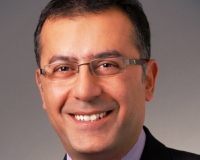 Speaking to Lapido from their headquarters in Baltimore, the IOCC’s director of programmes Mark Ohanian said that as conflict spreads throughout Damascus, the situation is increasing in intensity.
Speaking to Lapido from their headquarters in Baltimore, the IOCC’s director of programmes Mark Ohanian said that as conflict spreads throughout Damascus, the situation is increasing in intensity.
‘Everyday life for Syrians is becoming increasingly difficult, with prices for everyday staples rising. Families who had never dreamed of leaving their homes are fleeing as the situation becomes ever more desperate,’ he said.
‘The work of the churches not only provides immediate tangible assistance but it indirectly serves as a point of reconciliation between the various constituents of Syrian society.
‘We are providing aid to all people regardless of political beliefs or faith affiliations.’
But he recognised that although the churches are doing all they can, the need is overwhelming them, in a war which has seen more than 110,000 people killed and seven million displaced.
Janet Symes, head of Middle East at Christian Aid, told Lapido that any military intervention would be devastating.
'An escalation in military engagement is likely to worsen an already precarious humanitarian situation, and has the potential to jeopardise humanitarian access without bringing an end to the conflict any closer.
*Name changed for security reasons.
- Log in to post comments
